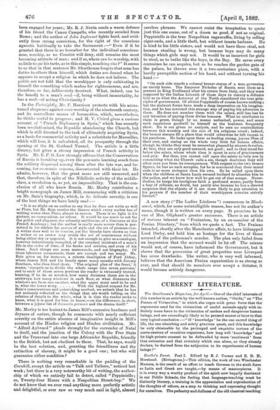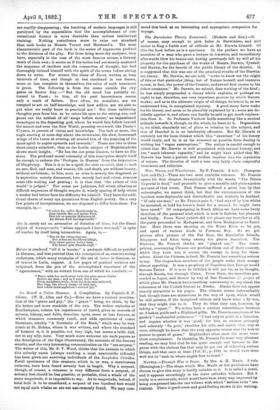Goethe's Faust. Part I. Edited by E. J. Turner and
E. D. H. Morshead. (Rivingtons.)—This edition, the work of two Winchester Masters, is the result of an effort to teach German to the sixth form as Latin and Greek are taught,—by means of masterpieces. It is in every way a worthy product of the spirit now happily dominant in our Public Schools, the feeling that language-teaching mast be distinctly literary, a training in the appreciation and reproduction of the thoughts of others, as a step to thinking and expressing thought for ourselves. The pedantry and dullness of the old classical teaching are rapidly disappearing ; the teaching of modern languages is still paralysed by the superstition that the accomplishment of con- versational flaency is more desirable than serious intellectual training. Nothing contributes more to raise our standard than such books as Messrs. Turner and Morehead's. The most characteristic part of the book is the series of arguments prefixed to the divisions of the play. Far from being mere dry analyses, they
have, especially in the case of the most famous scenes, a literary merit of their own ; it seems as if the writer had not merely mastered the sequence of incident and the connection of thought, but had
thoroughly imbued himself with the spirit of the scene before sitting down to write. For scenes like those of Faust, written at long
intervals of time, and though at last combined in one drama, more or less complete in themselves, the value of such treatment is great. The following is from the scene outside the city gates on Easter Day :—" But the old mood has partially re- turned to Faust ; to him, all his past benevolence seems only a mark of failure. How often, he moralises, are we tempted to act on half-knowledge, and how seldom are we able to put what we really know to practical use ! But these saddening thoughts pass from him as he raises his eyes to the setting sun, and pours out the noblest of all 'songs before sunset,' an impassioned monologue to the departing god, whom he would fain follow beyond the sunset and over the New World, pressing westward, like Dante's
Ulysses, in pursuit of virtue and knowledge. The lark at morn, the eagle soaring at noon-day above the mountains, the slow, homeward wings of the heron at evening, all remind him of the yearning of the inner spirit to aspire upwards and onwards." There are two or three short essays attached; that on the fertile subject of Mephistopheles shows much insight. "He has the one great illusion, to have no illu- sions. The profound moral solemnity of this conception should itself be enough to redeem the Prologue in Heaven' from the imputation of blasphemy. This it is to be a spirit der stets terneint, that to such an one, God, and man, and woman, life and death, are without beauty, without awfulness ; to him, even as wine is merely fire disguised, so is aspiration merely discontent, love merely lust and crime, remorse mere idle waiting and prating ; it is thus that the prince of this world' is judged." The notes are judicious, full where allusions or difficult sequences of thought require it, wisely sparing of help where a reader had better face the difficulty for himself. They have the addi- tional charm of many apt quotations from English poetry. On a very few points of interpretation, we are disposed to differ from them. For example, in,— " 0 saheb du, roller Mondenschein, Zum letzten Mal auf melee Pete, Den Mil so manche Maternacht An diesem Pelt herangewacht !"
den is surely not an accusative of duration of time, but the direct object of herangewacht, "whose approach I have watched," in spite wachen by itself being intransitive. Again, in,— " Das 1st der ewige Gesang,
Der jedem an die Ohrenklingt, Den, unser gauzes Leben lang, This heiser jede Stunde singe'
Heiser is rendered "till it is hoarse," a prolepsis difficult to parallel in German, and less poetical than the conception of an ever-recurring undertone, which many examples of the use of Meer in German, or of micas in Latin, suggest. A few pages of poetical versions are subjoined, from the pen of the accomplished translator of the ." Agamemnon," with an extract from one of which we conclude :— " There with her mellowing light the pure moon climbs
Before my gaze ; and as I gaze, there rise Prom mountain-walls, from thickets rain-bedewed, Hov'ring, the silvery shapes of long ago, And soften contemplation's sterner joy."



































 Previous page
Previous page